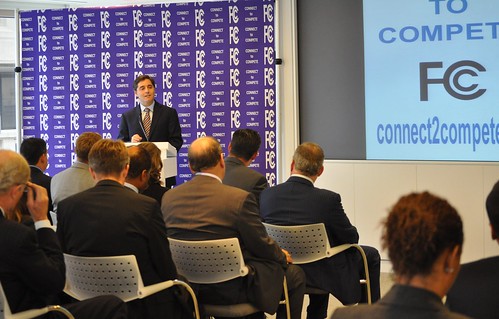Yesterday, joined by executives and nonprofit leaders, Chairman Genachowski announced a first-of-its kind national effort to address broadband adoption, digital literacy, and the employment skills gap. If you have a moment, there are two articles worth reading from USA Today and the New York Times.
Right now, nearly one-third of the country – 100 million Americans – don’t have high-speed Internet at home. That’s compared to Singapore and Korea where the adoption rates top 90 percent.
Some facts:
- More than 80 percent of Fortune 500 companies today, including Wal-Mart and Target, require online job applications.
- Students with broadband at home have a 6-8 percent higher graduation rate as compared to similarly situated students without broadband at home
- Fifty percent of today’s jobs require some technology skills – and this percentage is expected to grow to 77 percent in the next decade.
But the broadband adoption gap is also tremendous opportunity; imagine what having millions of more Americans digitally empowered can mean for the economy: millions more customers for online businesses, more Americans using cost saving e-government services, and more Americans with the digital skills needed to find and land the jobs of today and tomorrow.
Because broadband adoption is key to America’s competitiveness – to jobs, to e-government, to education – we must knock down the barriers to adoption: a) digital literacy, including a lack of trust, or concerns about privacy and safety online; b) cost of the device and connectivity; and c) relevance, the value consumers perceive from broadband.
While there is no silver bullet to close the adoption gap, yesterday’s announcements mark an important first step, particularly for two of those obstacles – digital literacy and consumer relevance.
Actions announced today include:
- The Chairman called for a Digital Literacy Corps to enable thousands more public libraries to hold in-person, basic digital literacy classes and allow schools to do the same after school hours(teaching Americans how to search, use e-mail, utilize parental controls, upload a resume, etc.). Last year, more than 30 million Americans used library connections to seek and apply for jobs, and 12 million children used them to do homework. The Digital Literacy Corps would help Americans, young or old, English or Spanish-speaking, get the skills they need to find and apply for a job, to access educational classes, find health care information, and utilize e-government resources.
- The Chairman also announced a series of offerings from private companies and non-profit, grass-roots organizations to expand digital literacy in communities and provide rich jobs and educational content. The committed companies include: Best Buy’s Geek Squad, Microsoft, Arise Virtual Solutions, CareerBuilder.com, Monster.com, MetrixLearning, BrainFuse, Sesame, and Discovery Education. The grassroots organizations include: the Boys and Girls Club, Goodwill, 4H, and members of the Broadband Opportunity Coalition-- the Asian American Justice Center, National Council of La Raza (NCLR), League of United Latin American Citizens (LULAC), National Urban League, One Economy, National Association for the Advancement of Colored People (NAACP), The Joint Center for Political and Economic Studies, and the Minority and Media Telecommunications Council (MMTC).
- The Chairman also announced the creation of “Connect to Compete” – a new non-profit initiative to help execute the commitments, host the jobs and educational content, develop a database with digital literacy classes, and help train digital literacy instructors across the country. For more details on “Connect to Compete” and its private sector and nonprofit partners, visit Connect2Compete.org.
Interested in learning more?
